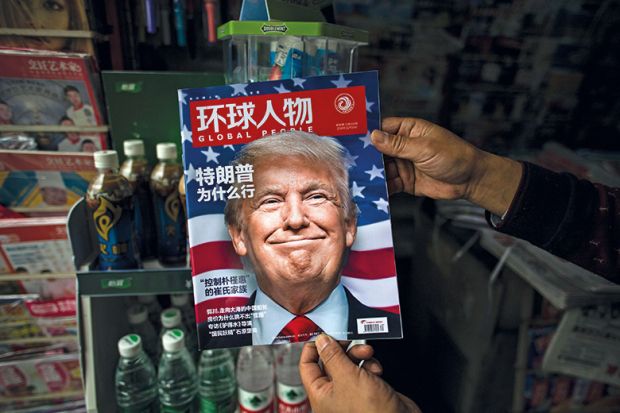A major analysis of future international student demand in the UK by London Economics, published by the Higher Education Policy Institute, says that while the Brexit vote “may have a deterrent effect on both higher education students and staff enrolling or working at UK higher education institutions, the recent United States presidential election might have a similar impact on the decision of internationally mobile students not to study in the US (potentially to the benefit of the United Kingdom)”.
The report is an econometric analysis making forecasts about future demand based on historic trends, so does not examine such hypotheticals.
However, Martha J. Kanter, President Barack Obama’s former lead on higher education as under secretary in the Department of Education, has told Times Higher Education that the potential for Donald Trump’s administration to “restrict, or in effect chill, foreign student enrolment” is one of the key themes for higher education that she identifies as arising from the election result.
Mr Trump’s angering of China over Taiwan could be particularly significant – China accounts for one-third of international students in the US and a major deterioration in relations between the two nations could impact that flow.
There is also the question of whether Mr Trump’s tone on immigration could deter some international students, as well as the impact from any potential tightening of visa policy.
Speaking about implications from the tone of the election campaign, Brad Farnsworth, interim vice-president of the American Council on Education’s Center for Internationalization and Global Engagement, said that “higher education in the United States is clearly very attractive to the rest of the world and it will continue to be”, adding that for students whose choice is driven by a desire to study at a particular institution, they are “probably not going to be affected”.
But Mr Farnsworth added: “There probably is a group of students who are affected by this and who are coming to this country because they want to have an international experience that gives them the ability to engage with the larger community here…That student we’re concerned about, but we don’t have enough data to know how it’s going to affect their flows.”
He continued: “Higher education for international students, it’s a global game. So we may see students who were thinking about coming to the US [then] go to the UK.
“And similarly with the [European Union] referendum in the UK, we may see students who were thinking about going to the UK coming to the US, or to Australia, or New Zealand, or other countries.”
Allan Goodman, president of the US-based Institute of International Education, which produces the Open Doors survey of US international student recruitment, said that many American institutions “have their own foreign policy” and “we are seeing that campus representatives are continuing to reach out to students to let them know that they are welcome”.
He added: “Open Doors data show that student flows are typically affected only by actual shifts in policy or due to other tangible factors such as economic fluctuations, and that students are largely unaffected by shifting perceptions or rhetoric.”
Register to continue
Why register?
- Registration is free and only takes a moment
- Once registered, you can read 3 articles a month
- Sign up for our newsletter
Subscribe
Or subscribe for unlimited access to:
- Unlimited access to news, views, insights & reviews
- Digital editions
- Digital access to THE’s university and college rankings analysis
Already registered or a current subscriber? Login






